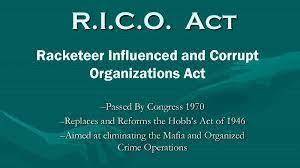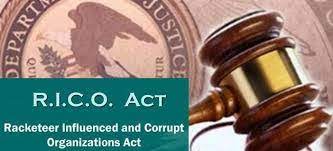The Racketeer Influence and Corrupt Organizations Act (RICO) is a federal law passed in 1970 to combat organized crime in the United States. The law is the ultimate killer that allows mobs to sue. Before the passage of the law, prosecutors were used to individually determine crimes related to thugs. Different mobs are believed to have committed every crime, and the government only prosecutes individual criminals, rather than shutting down the entire criminal organization.
Introduction to RICO Law

RICO law allows criminal prosecution and civil penalties for any extortion activities carried out in continuing criminal enterprises. Extortion activities may include illegal gambling, kidnapping, bribery, money laundering, murder, corruption, forgery, slavery, drug trafficking and many other unpleasant business practices. With RICO, this means that the government can now also hunt down the top leadership, killers and tone changers.
Justice under RICO Criminal Law
According to the RICO Criminal Law, government lawyers must prove that the defendant has participated in at least two extortion activities. The government must further prove that the defendant directly invested in, participated in, or maintained the interests of the criminal enterprise. The RICO criminal law has been used to prosecute members of the Mafia, rescue operations, hell angel motorcycle gangs, anti-abortion organizations, etc.

In this law, if an individual commits at least two of the 8 state crimes and 27 federal crimes (35 crimes) within 10 years, the He is accused. Once convicted of extortion, the period will be sentenced to a maximum of 20 years in prison, with a fine of up to $25,000 per charge of extortion. If the allegations are directly related to extortion activities, such as murder and drug trafficking, the person may be sentenced to life imprisonment. The law further stipulates that extortionists must abandon all improper interests and benefits of enterprises formed through the extortion model.
Lawyer selection under RICO law
When U.S. prosecutors prosecute individuals under the RICO criminal law, they can choose to seek an injunction or pretrial restraining order to temporarily seize the defendant’s property and prevent the transfer of property that may be confiscated. They may also require the defendant to provide a performance bond, because the owners of companies related to the Mafia often abscond with assets. By requesting a performance bond or injunction, the lawyer ensures that if the verdict is guilty, there will be something to catch.
